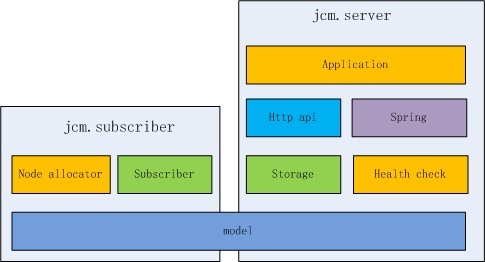JCM is a distributed name service implementation based on ZooKeeper.
- manage more than hundred thousand nodes (ip)
- map cluster name to node(ip) list
- health checking on every node
- persistent storage cluster list into zookeeper
- totally distributed, read and write every JCM server
- HTTP api based on JSON
-
start zookeeper first (standalone or distributed)
-
start JCM server
java -jar jcm.server-0.1.0.jar -
add some clusters with nodes to JCM with HTTP api
curl -i -X POST http://10.181.97.106:8080/c -H "Content-Type:application/json" --data-binary @./doc/cluster_sample.json -
use jcm.subscriber to subscribe clusters, to get nodes from JCM server
Subscriber is a library used in client side.
Subscriber subscriber = new Subscriber( Arrays.asList("127.0.0.1:8080"),
Arrays.asList("hello9", "hello"));
RRAllocator rr = new RRAllocator();
subscriber.addListener(rr);
subscriber.startup();
for (int i = 0; i < 2; ++i) {
System.out.println(rr.alloc("hello9", ProtoType.HTTP));
}
subscriber.shutdown();
see more examples jcm.subscriber/src/test
See doc/api.md
mvn package -Dmaven.test.skip=true
If run with tests, startup zookeeper first
Architecture overview:
Module overview:
/*******************************************************************************
* Copyright Kevin Lynx (kevinlynx@gmail.com) 2015
*
* Licensed under the Apache License, Version 2.0 (the "License");
* you may not use this file except in compliance with the License.
* You may obtain a copy of the License at
*
* http://www.apache.org/licenses/LICENSE-2.0
*
* Unless required by applicable law or agreed to in writing, software
* distributed under the License is distributed on an "AS IS" BASIS,
* WITHOUT WARRANTIES OR CONDITIONS OF ANY KIND, either express or implied.
* See the License for the specific language governing permissions and
* limitations under the License.
*******************************************************************************/

